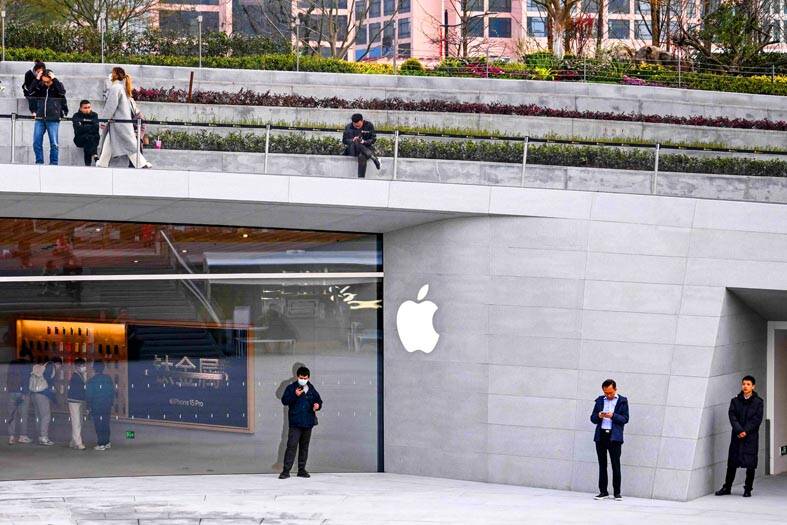Apple Inc removed social media services such as Meta Platforms Inc’s WhatsApp and Threads from its Chinese app store, complying with orders from Beijing to close more loopholes in the country’s longstanding Internet firewall.
It also removed messaging services Telegram and Signal, consultants tracking the space said.
The Cyberspace Administration of China ordered the apps removed over national security concerns, said Apple, which has consistently complied with one of the world’s most rigid Internet censorship regimes.

Photo: AFP
The orders are part of a cleanup program Chinese regulators initiated last year, which would remove many defunct or unregistered apps from domestic iOS and Android stores, including local ones. In August last year, China asked all mobile app developers to register with the government by the end of last month or cease operations.
Beijing has barred the use of foreign messaging and social media platforms like WhatsApp for years, using what the industry calls the Great Firewall. That has helped apps like Tencent Holdings Ltd’s WeChat dominate domestic usage, though Chinese users can still use virtual private networks to view foreign media.
Less sensitive apps with more substantial Chinese businesses such as learning app Duolingo are expected to comply with the latest regulatory licensing regime to remain operational, AppInChina co-founder and CEO Rich Bishop said.
“It will mean that Chinese consumers are pretty much limited to just Chinese apps, with a small number of international ones,” said Bishop, whose consultancy has received dozens of inquiries from companies about how to stay compliant and publish software in China. “That’s quite a big change — so it will further cut off Chinese citizens from the rest of the world in a sense.”
The action against US tech services comes as it takes steps toward banning TikTok, the hit video app under Beijing-based ByteDance Ltd. US politicians have also cited national security concerns in their push to force the company to either sell TikTok to a non-Chinese owner or face a ban in the US.
“We are obligated to follow the laws in the countries where we operate, even when we disagree. The Cyberspace Administration of China ordered the removal of these apps from the China storefront based on their national security concerns,” Apple said in a statement. “These apps remain available for download on all other storefronts where they appear.”
The app registration process kicked off last year in what Beijing painted as a bid to counter telephone scams and fraud.
The Ministry of Industry and Information Technology said that it would carry out supervision work on those filings from April to June and take action against unregistered apps, adding that developers would also be required to set up and improve mechanisms to handle “illegal information.”
The move was regarded as another step by Beijing to tighten controls across its cyberspace, forcing Internet companies to scrub information considered politically sensitive. Beyond apps, Web sites and large language artificial intelligence models have also been subject to greater content curbs.

PROTECTION: The investigation, which takes aim at exporters such as Canada, Germany and Brazil, came days after Trump unveiled tariff hikes on steel and aluminum products US President Donald Trump on Saturday ordered a probe into potential tariffs on lumber imports — a move threatening to stoke trade tensions — while also pushing for a domestic supply boost. Trump signed an executive order instructing US Secretary of Commerce Howard Lutnick to begin an investigation “to determine the effects on the national security of imports of timber, lumber and their derivative products.” The study might result in new tariffs being imposed, which would pile on top of existing levies. The investigation takes aim at exporters like Canada, Germany and Brazil, with White House officials earlier accusing these economies of

EARLY TALKS: Measures under consideration include convincing allies to match US curbs, further restricting exports of AI chips or GPUs, and blocking Chinese investments US President Donald Trump’s administration is sketching out tougher versions of US semiconductor curbs and pressuring key allies to escalate their restrictions on China’s chip industry, an early indication the new US president plans to expand efforts that began under former US president Joe Biden to limit Beijing’s technological prowess. Trump officials recently met with their Japanese and Dutch counterparts about restricting Tokyo Electron Ltd and ASML Holding NV engineers from maintaining semiconductor gear in China, people familiar with the matter said. The aim, which was also a priority for Biden, is to see key allies match China curbs the US

Teleperformance SE, the largest call-center operator in the world, is rolling out an artificial intelligence (AI) system that softens English-speaking Indian workers’ accents in real time in a move the company claims would make them more understandable. The technology, called accent translation, coupled with background noise cancelation, is being deployed in call centers in India, where workers provide customer support to some of Teleperformance’s international clients. The company provides outsourced customer support and content moderation to global companies including Apple Inc, ByteDance Ltd’s (字節跳動) TikTok and Samsung Electronics Co Ltd. “When you have an Indian agent on the line, sometimes it’s hard

‘SACRED MOUNTAIN’: The chipmaker can form joint ventures abroad, except in China, but like other firms, it needs government approval for large investments Taiwan Semiconductor Manufacturing Co (TSMC, 台積電) needs government permission for any overseas joint ventures (JVs), but there are no restrictions on making the most advanced chips overseas other than for China, Minister of Economic Affairs J.W. Kuo (郭智輝) said yesterday. US media have said that TSMC, the world’s largest contract chipmaker and a major supplier to companies such as Apple Inc and Nvidia Corp, has been in talks for a stake in Intel Corp. Neither company has confirmed the talks, but US President Donald Trump has accused Taiwan of taking away the US’ semiconductor business and said he wants the industry back